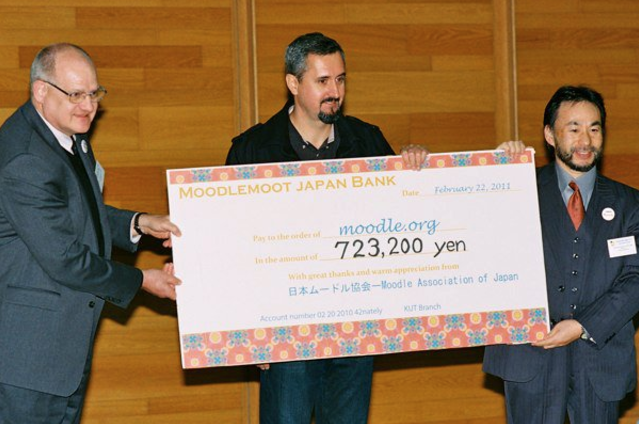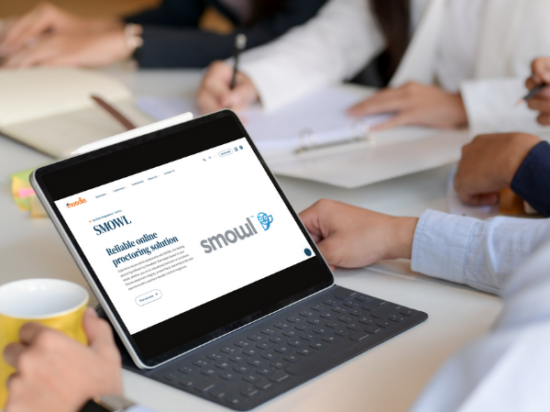MoodleMoot conferences are held around the world, with a focus on encouraging collaboration and sharing of best practices of the open source learning platform.
MoodleMoots started when the global Moodle community saw a need to come together and share their experiences with the open source platform – what they have learnt, what works and what doesn’t – so others can learn from those experiences to enhance and improve their Moodle sites.
In 2017, there are many MoodleMoots happening across the world! One of the earliest MoodleMoot into the new year is MoodleMoot Japan – an annual conference organised by the Moodle Association of Japan.
MoodleMoot Japan has been held every year since 2009. This year, it will be held from 17 – 19 February at Jichi Medical University in Tochigi, Japan.
Moodle HQ recently talked with Professor Hideto D. Harashima, the President of the Moodle Association of Japan, to find out about what activities, presentations and innovations, participants can expect at MoodleMoot Japan 2017.
Moodle HQ: Thank you Professor Harashima for taking the time to talk to us about MoodleMoot Japan 2017.
For those not familiar with the Moodle Association of Japan and MoodleMoot Japan, would you be able to please start with providing a brief background history of both?
Professor Harashima: The first MoodleMoot Japan was organised by a handful of enthusiastic teachers using Moodle back in 2009. The venue was snow-covered Hakodate in Hokkaido. Fifty people gathered from all parts of Japan for 25 presentations and workshops. Building up a network of Moodlers in Japan was another big purpose of this first MoodleMoot.
At the second MoodleMoot the following year, with 120 attendees, we had a general discussion meeting to create an Association. We needed one because of two main reasons:
- the same school cannot host the MoodleMoot every year;
- we had been craving for a system to financially support Moodle HQ by membership dues rather than by donations which is not a familiar part of the Japanese culture.
The Moodle Association of Japan Founding Committee members were elected and I was assigned the leadership, with Prof. Don Hinkelman as deputy. Both Professor Hinkelman and I had prior experience of taking the lead in the worldwide Moodle Fund-raising Campaign for several years and in the Moodle for Language Teaching forum. We believe this scheme of ours to support Moodle HQ by membership dues inspired the (International) Moodle Users Association into being.
At the third MoodleMoot, we invited Dr. Martin Dougiamas to Kochi and officially inaugurated the Moodle Association of Japan (MAJ). I was elected the first president, and we enacted our Constitution and the Bylaws at the first AGM of 180 members with Martin attending.
The goals of our organization were acknowledged as:
- To promote the use of Moodle in Japan
- To create a community for Japanese Moodlers to exchange information
- To promote research and development of Moodle
- To disseminate good practices of educating with Moodle and educational materials
- To help support Moodle headquarters financially
- To plan and administer the annual MoodleMoot Japan
At the closing ceremony, we presented a large cheque to Martin with a pledge of continuing support to Moodle HQ.
Since then, seven MoodleMoots have been held, including Tochigi, and we have 200 to 300 participants constantly at each MoodleMoot. This Tochigi MoodleMoot, from 17 – 19 February, is the first official MoodleMoot we are holding, and we are very much excited to welcome people from over the world.

Moodle HQ: This MoodleMoot marks nine years since the first MoodleMoot Japan in 2009. What are some of the key activities or themes that participants can expect in 2017, that are different or enhanced from previous years?
Professor Harashima: The theme of our MoodleMoot this year is “Active Learning: the Moodle Way.”
The notion of “active learning” may not be familiar to people outside of Japan, but it is a buzzword in education here in Japan. It means a learning/teaching style that invokes active participation of students in activities such as discussions, collaborations, and presentations.
Moot participants can expect a number of presentations on how we can “activate” students using Moodle. One of our keynote speakers, Dr. Shigeru Hoyashita, will talk about the very topic as the Director of the Creative Learning Center of his university.
Also, as we are holding our MoodleMoot at a medical school this year, we have scheduled a special session on the use of moodle for training in medical and nursing disciplines. Participants interested in this area will find a series of presentations very informative.
Moodle HQ: Who should attend MoodleMoot Japan and what would you like participants to achieve or learn about at the upcoming conference?
Professor Harashima: The characteristics of MoodleMoot Japan are research-oriented, practical, and grassroots. Many of the presentations are research-based, and that’s the strongest point of our MoodleMoot. Educational researchers, instructional designers, and system administrators will surely find the presentations stimulating. Every year we publish an ISSN-numbered Proceedings after the moot. A number refereed and non-refereed papers of high quality are collected there.
Also, there are a lot of presentations and workshops with practical ideas that participants can take home and use in classrooms. In addition, the Japan MoodleMoot is a grassroots event, organised by everyday Moodle users.
Participants will learn what it is like to be a part of a MoodleMoot run by the people, of the people, for the people. The participation fee is breathtakingly low — only 10,000 yen (about 85 US dollars!), and most proceeds are provided to the Moodle Users Association as a membership fee, plus donations (to Moodle HQ).
On top of nearly 50 regular, lightning-style, and case-study presentations, we have 12 hands-on workshops for beginners to advanced Moodlers on the first day, Genius Bar to consult technical problems with experts, and commercial displays and presentations with free lunch.
Keynote speeches will be delivered by Dr. Martin Dougiamas and Dr. Shigeru Hosoyama. The networking reception is the highlight to build up working connections with like-minded people. Lastly, there will be a ceremony to honor this year’s winners of our R&D Grants, Best Moodle Innovation Awards, and Best Open Courseware Awards (for courses made available on the MAJ Hub). Participants will enjoy a variety of program as above which can be found at none other than MootJP.
Moodle HQ: We saw that the vetting process for presentation submissions for MoodleMoot Japan is now finalised. Without giving too much information away, what are some of the presentation topics that you think many participants would enjoy attending?
Professor Harashima: Our presentations are given in two languages: English and Japanese, about half and half. Participants will learn which language is used when they see the title in the schedule. Japanese titles mean they are conducted in Japanese language. Some of the interesting-looking presentations you can expect include ones on extensive reading, lesson module enhancement, analytics plugin, automated quiz and feedback questions production, IoT, and collaboration using LTI. These presentations have caught my eyes and I am looking forward to attending them.
Moodle HQ: MoodleMoot Japan 2017 is being held at Jichi Medical University in Tochigi. Why was this venue chosen and what are some of the social or cultural activities that participants can enjoy in the town, especially if they are new to the area?
Professor Harashima: MootJP is like a Movable Feast; there is no fixed dates or venues. We look for a new venue each year because:
- it’s so much work on the local organizing staff to host a MoodleMoot; once is almost enough,
- we want to promote Moodle to local people of different areas of Japan by offering free Moodle workshops to them.
We also search for a school that provides complimentary conference hosting for the MoodleMoot so that we can make sure that our donations proceeds will assist the MUA and Moodle HQ. Jichi Medical University has been generous to let us use their facilities for this year’s MoodleMoot.
Tochigi, especially the city of Utsunomiya, is famous for Gyoza dumplings. There is a statue of Gyoza in front of Utsunomiya station. We learned Gyoza is one of Martin’s favorite food, so we plan to serve Gyozas fried right in front of your eyes at the reception party. Strawberries and ramen noodles are also Tochigi specialties.
Nikko is a historic sightseeing spot, but it is not recommended in a winter time. At this time of year, tourists should rather enjoy skiing, skating, and hot springs.
Moodle HQ: Finally, MoodleMoot Japan 2017 is from 17 – 19 February. It is not too late to register participation. How does someone register and what are some of the important dates we need to note in our diaries?
Professor Harashima: All people wanting to participate can register and pay the fee online at our MoodleMoot site: https://moodlejapan.org/course/view.php?id=66
Important dates for MoodleMoot Japan 2017 include:
- February 8th (Wed): registration deadline for general participants
- February 17 (Fri): workshop day
- February 18th (Sat)-19th (Sun): main conference
- February 18th (Sat): reception party
- April 30th (Sun): tentative deadline for proceedings paper submission

Thank you Professor Harashima for taking the time to talk to Moodle HQ about the upcoming (and exciting) MoodleMoot Japan 2017.
For more information, visit: https://moodlemoot.org
You can also updates on MoodleMoot Japan 2017 via Twitter by using #MootJP17




